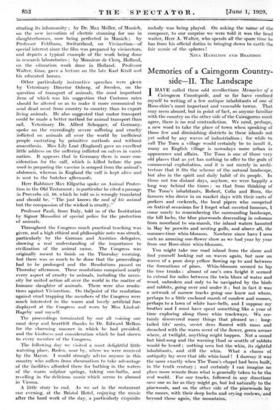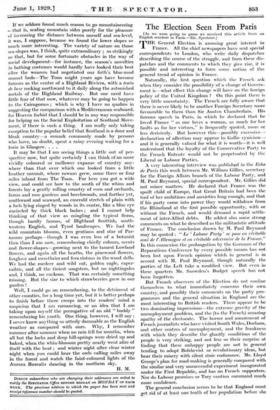Memories of a Cairngorm Country- side—IL The Landscape
I _HAVE called these odd recollections Memories of a _ • Cairngorm countryside, and so far have confined myself to writing. of a few antique inhabitants of one of Ross-shire's most important and 'venerable towns. _ That may seem absurd, but in point Of fact, as' anyone familiar . • _ - • . with the country On the other Side Of the Cairngorms must agree, there is no real contradiction .' We need, perhaps, a new Ward to take the place of town when speaking of those few' and diminishing districts -in these Wands net yet soiled by any N,Lives of industrialism ; for while to call The Toon a village would Certainly be to insult it, many an English village is nowadays more urban in appearance and affairs. The Toon is one, of those very old places that as yet has nothing to offer to the gods of commercial exploitation, and it is not merely in archi- tecture that it fits the scheme of the natural landscape, but also- in the Spirit and daily habit of its people. In 'those not too distant days, anyhow, we were happily a long way behind the times ; so that from thinking of The Toon's inhabitants, Robert,. Cohn and Rora, the farmers who drove in on market days with their carts Of porkers and cockerels, the local pipers who competed on festival occasions for I forget what coveted honours, I come surely to remembering the surrounding landscape, the hill lochs, the blue pinewoods descending in columns from moorland to sea-marsh, the inland waters haunted in May by peewits. and nesting gulls, and •above all, the summer-time whin-blossom. Nowhere since have I seen such an amazing one-flower show as we had year by year from our Ross-shire whin-blossom.
You might take one road inland from the shore and find yourself looking out on waves again, but now on waves of a pure deep yellow flowing up to and between the formations of pines. Whin-blossom seemed to lap the tree trunks : almost of one's own height it seemed to extend for miles between the twin blues of water and wood, unbroken and only to be navigated by the birds and rabbits, going over and under it ; but in fact it was a network 'of narrow tracks going one knew not where, perhaps to a little enclosed marsh of sundew and mosses, perhaps to a lawn of white hare-bells, and I suppose my brother and I must have spent something like a year of time - exploring along those whin trackways.. We cer- tainly discovered many things that pleased us : long- tailed tits' nests, secret dens floored with moss and • drenched with the warm scent of the flower, green arenas where, at twilight, anything might happen. Not a sound but bird-song and the warning thud or scuttle of rabbits would be heard ; nothing seen but the whin, its rightful inhabitants, and still the whin. What a charm of antiquity lay over that idle whin-land ! I daresay it was the same exactly when The Toon's chapel had been built; in the tenth century ; and certainly I -can imagine no place more remote from what is generally taken to be the real world. For our tracks, followed in any directions save one as far as they might go, but led naturally to the pinewoods, and on the other side of the pinewoods lay the moors, with their deep lochs and crying curlews, and beyond those again, the mountains. If we seldom found much reason to go mountaineering —that is, scaling mountain sides purely for the pleasure of increasing the distance sbetween oneself and sea-level, it was, I suppose, because we found the lower slopes so much more interesting. The variety of nature on those sea-slopes was, I think, quite extraordinary ; so strikingly so that, but for some fortunate obstacles in the way of social development—for instance, the season's novelties in bathing costumes would hardly have looked their best after the wearers had negotiated our firth's blue-mud mussel beds—The Toon might years ago have become famous as the centre of a Highland Riviera, with a train de lure rocking northward to it daily along the astonished metals of the Highland Railway. But one need have little fear of that now, whatever may be going to happen to the Cairngorms ; which is why I have no qualms in suggesting the comparison with a Mediterranean seaboard, for Heaven forbid that I should be in any way responsible for helping on the Social Exploitation of Scotland Move- ment, if there is such a thing. I am really only taking exception to the popular belief that Scotland is a dour and bleak country—a remark commonly made by persons who have, no doubt, spent a rainy evening waiting for a train in -Glasgow. . .
It may be that I am seeing things a little out of per- spective now, but quite certainly I can think of no more vividly coloured or mellower expanse of country any- where than that over which one looked from a little heather summit, where rowans grew, some three or four miles inland from The Toon. For here you got a wide view, and could see how to the south of the whins and forests lay a gently rolling Country of corn and orchards, farms and rose gardens and beechwoods, and further yet, southward and seaward, an emerald stretch of plain with a loch lying ringed by woods in its centre, like a blue eye encircled by thick black lashes ; and 'I cannot help thinking of that view as mingling the typical floras, though hardly faunas, of .Highland Scottish, south- -Western English, and Tyrol landscapes. We had the Wild mountain blooms, even gentians and star of Par- nassus perhaps—though I was even less of a botanist then than I am now, remembering chiefly colours, scents and flower-shapes—growing next to the tamest Lowland flowers, and again all the heaths, the pinewood flowers, foxglove and sweetbrier and fern riotous in the wood -dells. We had the roedeer and wild cat, golden eagle, caper- cailzie, and all the tiniest songsters, but no nightingales and, I think, no cuckoos. That was certainly something missing. But the size to which strawberries -grew in our garden !
Well, I could go on remembering, to the detriment of other counties, for a long time yet, but it is better perhaps to finish -before there creeps into the readers' mind a suspicion that. I am romancing, or an idea that I am taking upon myself the prerogative of an old "buddy" remembering his youth. One thing, however, I will say : I never knew anything so utterly damnable as the English weather as compared with ours. Why, I remember summer after summer when no rain fell for months, when all but the lochs and deep hill-springs were dried up and baked, when the whin-blossom pretty nearly went afire of itself with the .heat ; and winter night after clear winter -night when you could hear the owls calling miles away in the forest and watch the faint-coloured lights of the Aurora Borealis dancing in the northern sky. H. M.











































 Previous page
Previous page